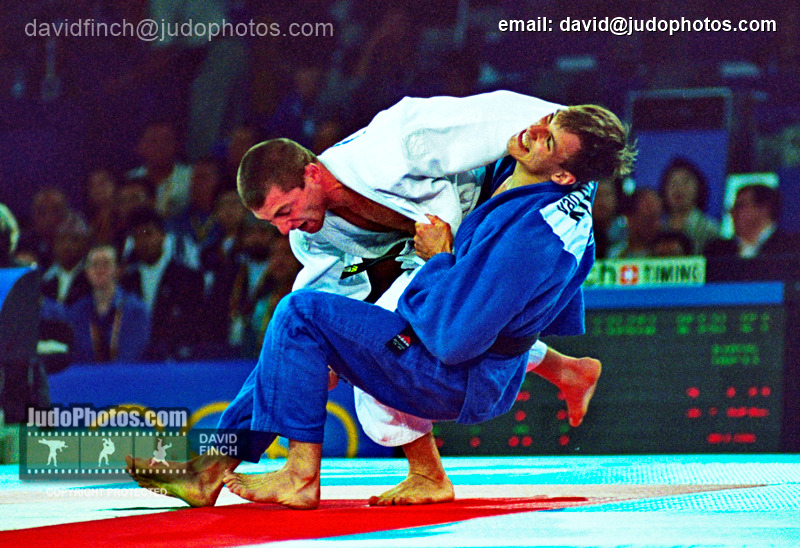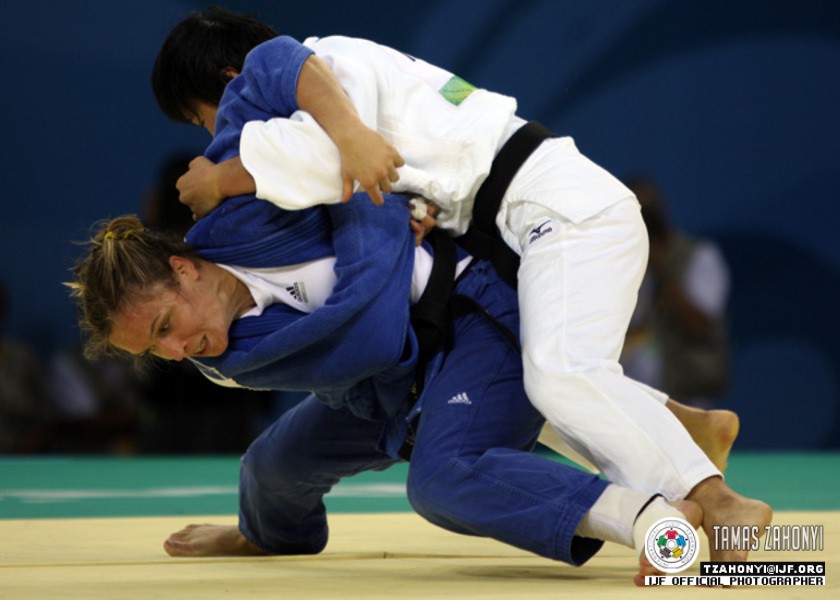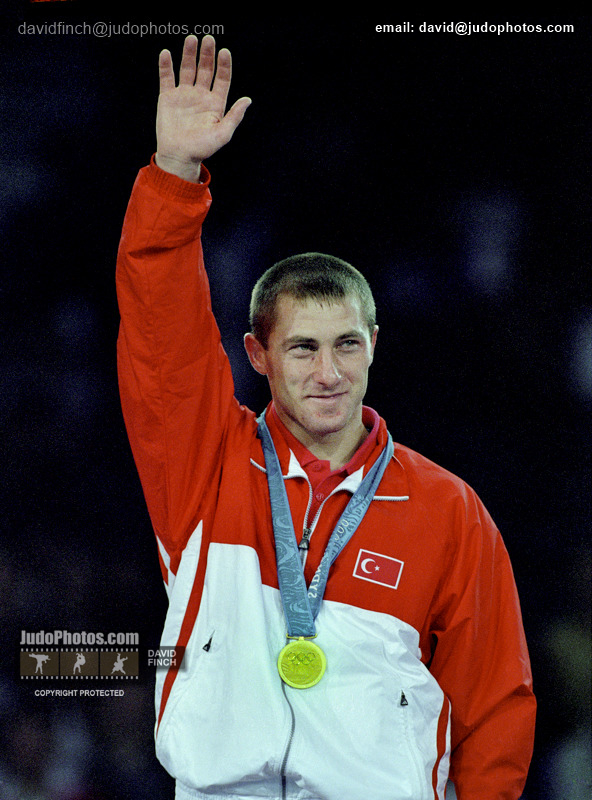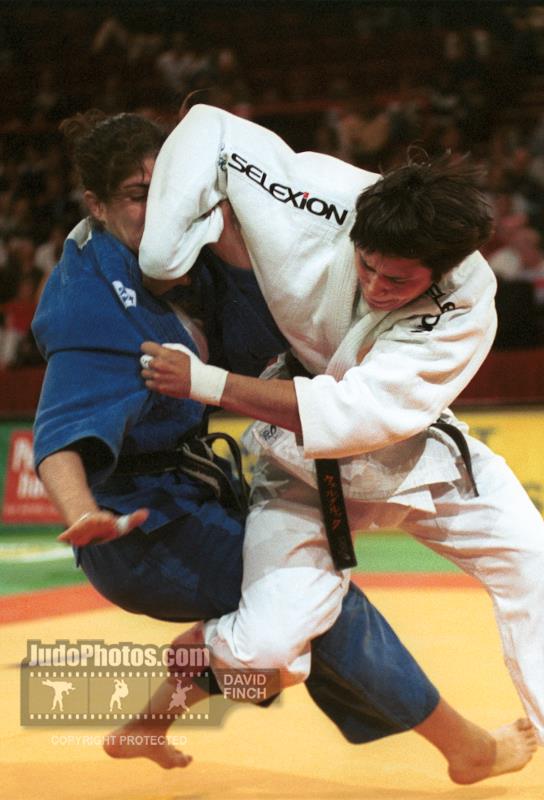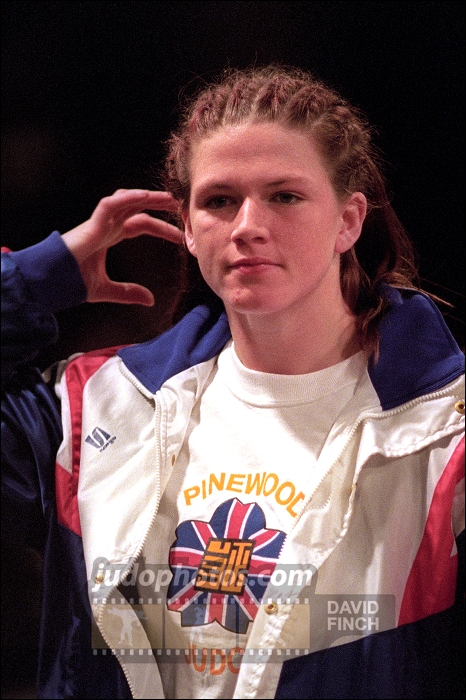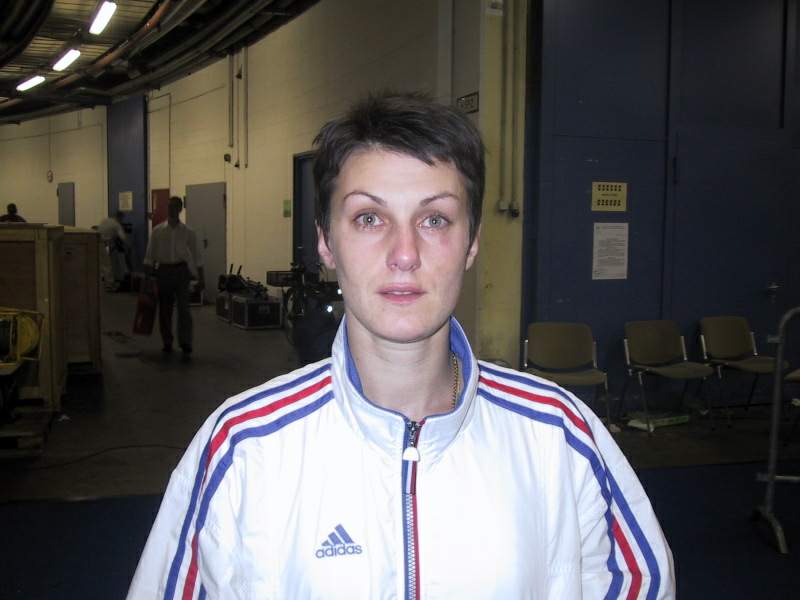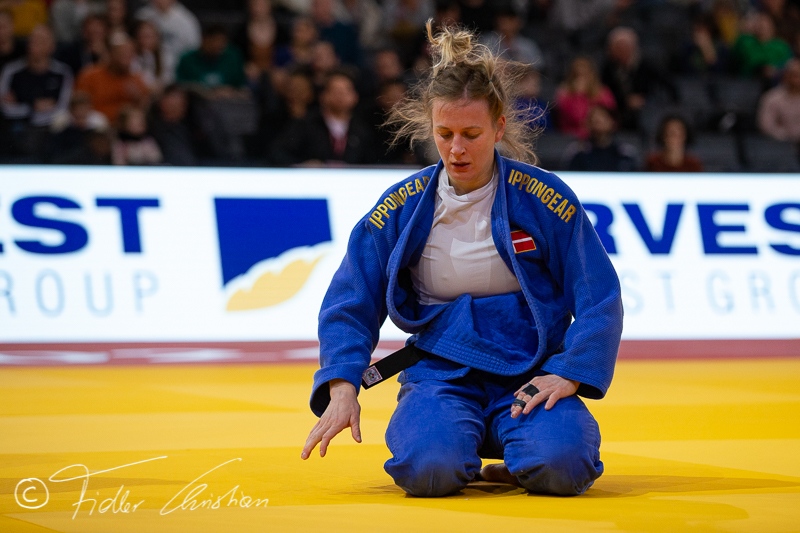Report of the European Championships 2000 in Wroclaw Day 2
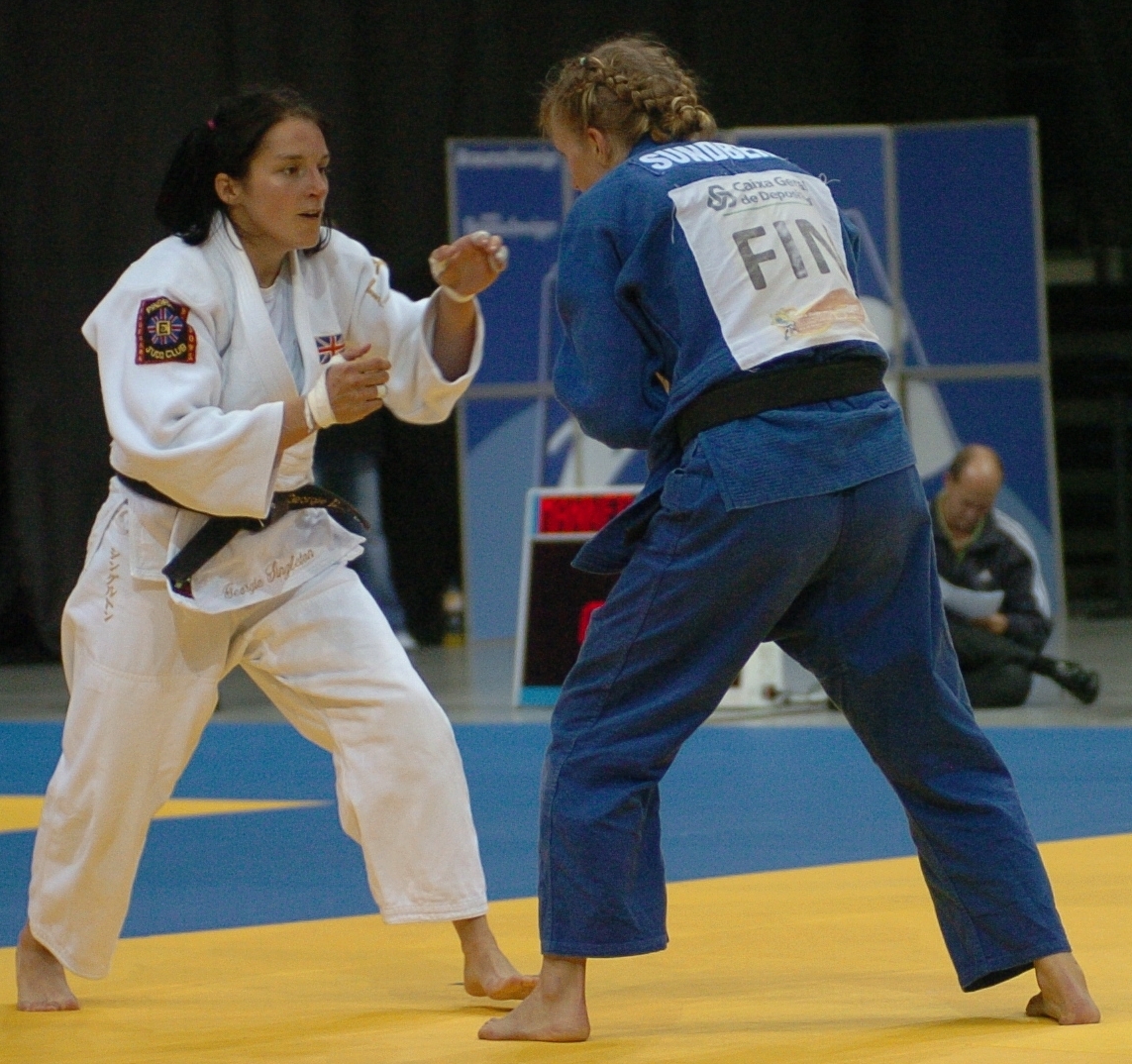
 21 May 2000 22:30
21 May 2000 22:30
 TWOJ, the world of Judo, by Barnaby Chesterman
TWOJ, the world of Judo, by Barnaby Chesterman
 Robert Danis
Robert Danis
With three medals secured at the first day of the European Championships in Wroclaw, Britain were tucked away just behind Russia in the overall medals table at the end of the first day of finals. On the next day Georgina Singleton added one more in the -52kg. First up was the Belgian, Inge Clement, and Singleton spun her on a mid-air-sixpence to counter a seoi-nage attack with a whipping te-guruma for ippon. She then took on Miren Leon of Spain and, with 30 seconds to go, led by yuko from osoto-gaeshi. Leon then seemed to lose her head as the contest appeared to get stuck on repeat. Four times she charged at Singleton only to be thrown with left seoi-nage on each occasion. Three of those earned small scores but still the Spaniard didn't catch on. In fact the end buzzer came as a bit of a relief for the beleaguered Leon.
Singleton enjoyed a barnstorming semi-final against Deborah Gravenstijn of the Netherlands. The pair went at each other with hammer and tong but incredibly neither managed to score. Towards the end they mustered up every last energy reserve to keep going but somehow a combination of twists, blocks and flops kept it scoreless. The decision could have gone either way but Singleton nicked it 2-1. It was a classic fight and a great moment for someone who is supposedly just a reserve and was only fighting because of an injury to Debbie Allan. In the final she met Laetitia Tignola of France who was taking full advantage of her selection over the Olympic champion, Marie-Claire Restoux.
For the most part the final was a stale-mate and both picked up two penalties for passivity. It was decided 20 seconds from the end with a shocking piece of inconsistent refereeing. Neither had been attacking but had exchange pointless kicks for a while when the referee called matte. It seemed that both would rightly pick up keikoku but inexcusably only Singleton was penalised. There was little time left to get the score back and if ever there was a case of 'I was robbed, guv', this was it. A decision could have gone either way so there is no guarantee the result would have been different, but to lose like that is disheartening. Singleton was a little tricky to interview afterwards, but after berating me for "slating" her in the European Teams report last year, she agreed to speak. Not before her coach Don Warner had weighed in as well, criticising me grammar. I don't know what he were talking about. Anyway, eventually Singleton said: "I'm pretty gutted because I felt we should both have had keikoku. But I'm pleased with the people I beat because it proves I am one of the best fighters in Europe."
That was the end of the British medals and it was good enough to finish sixth in the overall medals table but there were also three fifth places to cheer. Jenny Brien, in her first Europeans, threw Sabrina Filzmoser of Austria for ippon with ouchi-gari before being pinned with yoko-shiho-gatame by the experienced former champion, Jessica Gal of the Netherlands. Brien threw Ieva Klimasauskiene of Lithuania for ippon in the repechage and then won a split points decision against Cinzia Cavazutti of Italy to fight for -57kg bronze. She narrowly lost by yuko and koka to Michaela Vernerova of the Czech Republic who was also a bronze medallist from the Worlds, but it was still an excellent performance.
Simone Callender lost to the reigning champion, Katja Gerber of Germany on penalties in the Open. She bounced back, though, and threw Virginie Jaulin of France for ippon. She then won a split points decision against Gornicka to the dismay of the home crowd. She could not quite make it onto the podium, though, as Bojilova threw her for ippon with an ouchi-gari counter to her kosoto-gari attack. It was nonetheless a positive result for Callender who will soon be climbing the rostrum in a senior championship.
Once again John Buchanan narrowly missed out on a medal in the -60kg but created much excitement along the way. He beat Albert Techovas of Lithuania with two yukos and then strangled the dangerous Moldavian, Georgi Kurdghelashvili. He then came up against Eric Despezelle of France and in a couple of mad seconds was twice thrown for yuko with te-guruma. Matte should probably have been called after the first one, but Buchanan sprung up too quickly and was caught again.
It is in the repechage where the Scot really loves to excite and he beat the double reigning champion, Oscar Penas of Spain, with two yukos from kata-guruma. That same technique then put paid to David Moret of Switzerland for waza-ari before a bronze fight against Cederic Taymans of Belgium. Buchanan started more positively but was thrown for yuko and then ippon so he could only add fifth at the Europeans to his same placing at the Worlds. Even so he is great to watch and I am sure, as are several of his team-mates (one described him as the best fighter in Britain), that he will win a medal soon.
As for the rest it just was not quite happening for the men. David Somerville narrowly lost to Islam Matsiev by yuko and it looked likely that he would get another chance in the repechage as Matsiev was the favourite. Surprisingly the Russian lost to Victor Bivol of Moldova so Somerville unfortunately missed out. Winston Gordon dislocated his finger in losing to Fernando Gonzalez in the -90kg. Keith Davis lost to Pedro Soares of Portugal in the -100kg and then lost to Luigi Guido of Italy in the repechage. Luke Preston, deputising for Graeme Randall, did well in the -81kg. He threw Marcello Novais of Sweden for ippon in just 19 seconds with a brilliant sode-tsurikomi-goshi. He then lost by yuko to the eventual winner, Sergei Aschwanden of Switzerland, and was also edged out in the repechage by Matti Lattu of Finland.
Lee Burbridge was undone by controversy in the -73kg. He threw Varuzhan Israyalyan of Armenia for waza-ari with ura-nage and then again with morote-gari. He looked on fire and threw Miguel Almeida of Portugal for waza-ari with tani-otoshi before another waza-ari was awarded and then changed to an ippon. Burbridge had done the throw but Almeida turned him over as he landed. The referee awarded the fight to Burbridge but the other judges overruled him and it went to the Portuguese. Such is the fine line between success and failure in judo, Almeida went on to win gold and Burbridge, who would have qualified for the Olympics with a medal, lost his second repechage fight against Olivier Schmutz of Switzerland.
A couple of women also had miserable tournaments. Vickie Dunn was thrown for ippon with a lovely sode-tsurikomi-goshi by Laura Moise of Romania, who went on to win the -48kg. Dunn was then thrown for ippon by Tatiana Moskvina of Belarus in the repechage. Karen Roberts beat Andrea Cavalleri of Portugal in the -63kg but was then pinned by the ne-waza master, Gella Vandecaveye of Belgium. Vandecaveye went on to win her 6th European title and also received the first ever joint-European player of the year award, with Isabel Fernandez of Spain. The men's award went to Larbi Benboudaoud of France.
Roberts had a chance in the repechage, but, after having a waza-ari overruled for nothing, was thrown for ippon by Regina Mikute of Lithuania. Roberts admitted she needed to get back to scrapping afterwards, since that was what won her a World Championship bronze medal. Both her and Dunn will be at the Olympics so they can try to redeem themselves there. In fact the whole women's team have qualified for the Olympics but disappointingly just Buchanan, Somerville and Randall have from the men. Billy Cussack was then at pains to ask me what I was going to write about the Scottish men's Olympic team. Well Billy, if they win in Sydney, they will be British sporting icons. But if they lose, they will be a bunch of kilted pansies.
 like
like
 share
share

